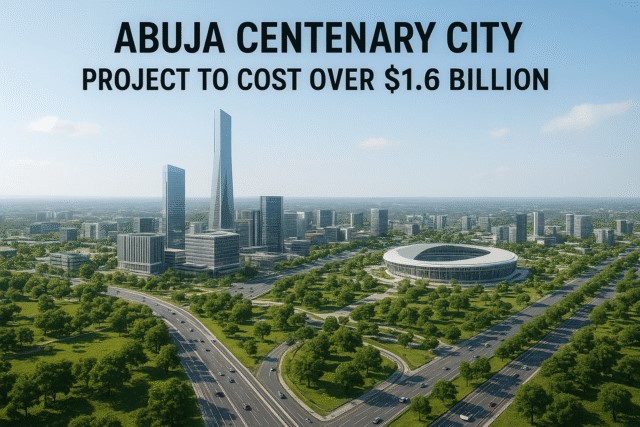By Nehemiah Anini for The Chronicles of Construction

Abuja is set to welcome a bold new chapter in urban development as the Centenary City Project restarts, with a projected cost exceeding $1.6 billion (₦2.4 trillion). Speaking with journalists in Abuja, the Managing Director, Dr. Ike M. Odenigwe, revealed that the city is designed to be a multifunctional hub, offering residents a complete cosmopolitan lifestyle.
THE FIRST PHASE: SETTING THE FOUNDATION
The first phase of construction has been awarded to Messrs Julius Berger Nigeria PLC at a cost of ₦750 billion. This stage will:
- Deliver primary infrastructure across the project site.
- Provide detailed engineering designs to guide the full rollout of the masterplan.
Urban design consultancy firm Dar Al-Handasah Consultants will oversee the planning and ensure the project adheres to its original vision of a modern, nature-conscious city.
“The City Project will create value and boost Abuja’s image to attract international investment. It is designed to blend with nature, with districts and communities fitting into the natural landscape for a beautiful and peaceful suburban life,” Dr. Odenigwe explained.
FEATURES OF THE FUTURE CITY
Once complete, Centenary City will feature world-class amenities, including:
- Five-star hotels
- International Commerce Centre
- Mall of Africa
- Championship Golf Course & Estate
- Polo Course & Estate
- Nigeria & Safari Parks
- African Arts Museum
- Industrial Park
- Diverse entertainment options
These attractions aim to position the city as a regional hub of lifestyle, culture, and business.
A PROJECT REVIVED AFTER A LONG PAUSE
Dr. Odenigwe acknowledged that the project had stalled for more than a decade, but noted that it is now firmly back on track.
“We are proud of our long partnership with Julius Berger and DAR, and we are committed to working with their expert teams to start and finish the primary infrastructure of Centenary Economic City Free Zone, following our Board of Directors’ vision,” he said.
He added that the pause had driven up costs due to rising construction prices, making foreign investment more difficult. Still, the board insists “we cannot overlook this big project this time.”
SUPPORT FROM FEDERAL LEADERSHIP
The Managing Director credited the Minister of the FCT, Mr. Nyesom Wike, and the Minister of Housing and Urban Development, Arc. Ahmed Musa Dangiwa FNIA, for their support and leadership in backing modern urban renewal.
Both ministers have positioned the project as a model of sustainable development, with the potential to reshape Sub-Saharan Africa’s skyline and elevate Nigeria’s global urban planning profile.
For professionals, policymakers, and the general public, the Centenary City project represents more than just construction. It’s a statement of intent—to merge global standards with local realities, attract international investment, and redefine Abuja’s urban future.
Stay tuned with The Chronicles of Construction as we continue to track Centenary City’s progress and other landmark projects shaping Nigeria’s built environment.


